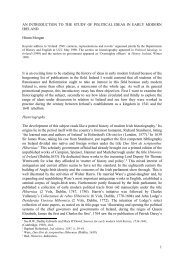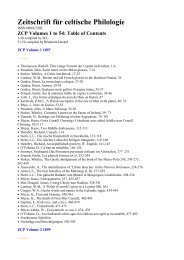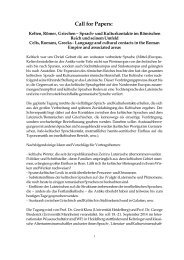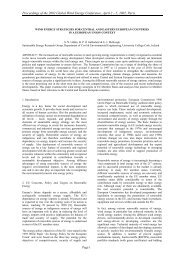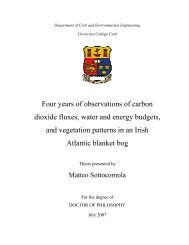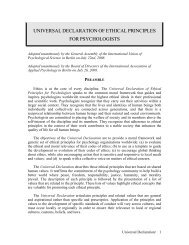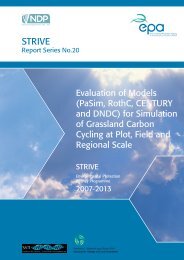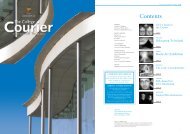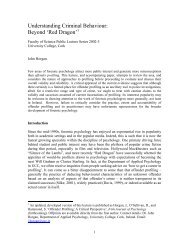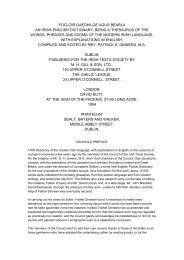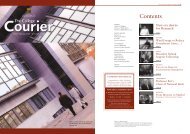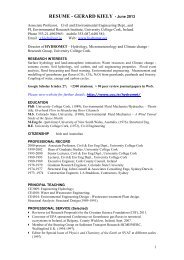PResident's RePORt 2009/2010 - University College Cork
PResident's RePORt 2009/2010 - University College Cork
PResident's RePORt 2009/2010 - University College Cork
You also want an ePaper? Increase the reach of your titles
YUMPU automatically turns print PDFs into web optimized ePapers that Google loves.
Foreword<br />
UCC at a Glance<br />
Academic Developments<br />
Teaching and Learning<br />
Research<br />
<strong>College</strong> Reports:<br />
Arts, Celtic<br />
Studies and Social<br />
Sciences<br />
Business and Law<br />
Medicine and Health<br />
Science, Engineering and<br />
Food Science<br />
Events<br />
Student Experience<br />
Sports and Recreation<br />
Buildings and Estates<br />
<strong>Cork</strong> <strong>University</strong> Press<br />
Finance<br />
Governing Body<br />
IRIS Appendix<br />
40<br />
• The Department of Epidemiology and Public Health have<br />
secured funding worth €300,000 from the Crumlin Children’s<br />
Research Centre for a study on ‘Childhood Obesity in Ireland:<br />
recent trends and determinants at the individual and ecological<br />
level’. The project will commence in April 2011.<br />
• The Department of Epidemiology and Public Health have also<br />
secured funding worth €250,000 from Safefood for research on<br />
‘The Cost of Overweight and Obesity on the Island of Ireland’.<br />
This project will commence in January 2011.<br />
• Dr John Cryan, Professor Ted Dinan and their colleagues have<br />
unravelled a novel mechanism underlying how early-life stress<br />
can alter the levels of a specific protein involved in controlling<br />
the amount of chemical glutamate which transmits nerve<br />
impulses in the spinal cord. If there is too much glutamate<br />
pain signals can occur. Decreased levels of the glutamate<br />
transporter, which normally mops up excess glutamate,<br />
results in an increased level of glutamate which contributes<br />
to the increased experience of abdominal pain seen in IBS<br />
patients. The researchers then used the drug riluzole, which<br />
is used clinically in the treatment of motor neuron disease, to<br />
activate this protein and reverse these effects. The research<br />
was supported by Science Foundation Ireland through a<br />
Centre for Science Engineering and Technology (CSET) grant<br />
to the Alimentary Pharmabiotic Centre (APC).<br />
• Following a decision to relocate the HRB Clinical Research<br />
Facility to the Mercy <strong>University</strong> Hospital, a satellite research unit<br />
for Paediatrics has been developed on the CUH campus which<br />
is the primary academic centre for paediatrics in <strong>Cork</strong>. The<br />
HRB Discovery Centre welcomed its first research volunteer in<br />
December <strong>2010</strong>. The centre will facilitate clinical assessment,<br />
data collection and evaluation of babies and children recruited<br />
to paediatric studies. The most active of these at present are the<br />
BASELINE birth cohort study led by Dr Deirdre Murray, which<br />
also includes assessment of skin barrier function’s association<br />
with food allergy led by Professor Jonathan Hourihane. The<br />
centre will also facilitate an FP7 research study on neonatal<br />
hypotension led by Dr Gene Dempsey due to commence in<br />
2011. Click here for more information. Professor Hourihane<br />
succeeds Professor David Kerins as UCC’s representative on<br />
the board of Molecular Medicine Ireland.<br />
• Dr Mark Tangney and his team at the <strong>Cork</strong> Cancer Research<br />
Centre have shown that a bacteria commonly found in probiotic<br />
yoghurts has been shown to be a safe and effective way to<br />
deliver gene therapies to treat cancer. The research, which has<br />
been funded by the HRB, was published in Nature (April <strong>2010</strong>).<br />
• Dr Patrick Harrison and Ciaran Lee (Physiology), in<br />
collaboration with Dr Martina Scallan (Microbiology), received<br />
a grant of $146,000 from Cystinosis Research Foundation,<br />
California for ‘Cystinosis gene repair’ whilst €298,000 of a<br />
multi-centre €9.6m FP7 programme Multi-FUN, was awarded<br />
to Dr Farouk Markos (Physiology) and €78,000 from IRCSET to<br />
study ‘Angiotensin peptides and kidney function’ was awarded<br />
to Julie O’Neill to work with Professor Edward Johns and Dr<br />
Vincent Healy, (all Physiology).<br />
• Professor Finbarr Allen was awarded €235,482 from the HRB<br />
for ‘Evaluation of minimally invasive oral healthcare for elderly<br />
Irish adults’.<br />
• Professor Helen Whelton was awarded €610,971 from the Oral<br />
Healthcare Industry for ‘Lough Bane Clinical Study to assess<br />
two dentifrices for the treatment of dentinal hypersensitivity’.<br />
• Professor Helen Whelton was awarded €306,947 from the Oral<br />
Healthcare Industry for ‘Lough Erne Clinical Study to assess<br />
two dentifrices for the treatment of dentinal hypersensitivity’.<br />
• Professor Helen Whelton was awarded €154,689 from the<br />
HRB for ‘Tackling oral health inequalities in pre-schoolers – an<br />
integrated approach’.<br />
• A collaborative link with Khartoum <strong>University</strong> Dental School,<br />
Sudan, and the <strong>Cork</strong> Dental School and Hospital yielded its<br />
first co-supervised PhD graduate, Dr Nada Sanhouri, in June<br />
<strong>2010</strong>. Dr Sanhouri was the first student to graduate from UCC<br />
having been cosupervised by a member of staff, Dr Hassan<br />
Ziada, at <strong>Cork</strong> Dental School.



